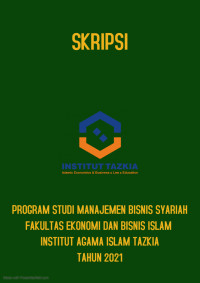Electronic Resource
DETERMINANT FACTORS OF SHARIA COMPLIANCE RETIREMENT PLANNING ACCEPTANCE BY PRIVATE SECTOR EMPLOYEES WITH SOCIO-DEMOGRAPHIC CORRELATION (CASE STUDY: BOGOR CITY)
Purpose – This study aims to determine the direct impact of Islamic financial
literacy and future orientation toward sharia compliance retirement planning, also
sees the correlation between socio-demographic (age, educational level, income and
gender) toward sharia compliance retirement planning.
Methodology/Approach – Using primary data by distributing online questionnaire
via google form. Respondents in this study are 100 Muslims private-sector worker
in Bogor city. The data analysis technique used is multiple linear regression and
Pearson correlation.
Findings – Islamic financial literacy doesn’t impact sharia compliance retirement
planning meanwhile future orientation significantly impacting sharia compliance
retirement planning. Age has no relationship; the educational level has and negative
and insignificant relationship toward sharia compliance retirement planning.
Income and gender have a positively weak and insignificant relationship toward
sharia compliance retirement planning.
Availability
Detail Information
- Series Title
-
-
- Call Number
-
REF 658.15 RAI d
- Publisher
- Bogor : IAI Tazkia., 2021
- Collation
-
MBS
- Language
-
English
- ISBN/ISSN
-
NIM.17101070
- Classification
-
658.15
- Content Type
-
-
- Media Type
-
-
- Carrier Type
-
-
- Edition
-
-
- Subject(s)
- Specific Detail Info
-
-
- Statement of Responsibility
-
Ashilah Raihanah
Other version/related
No other version available
File Attachment
Comments
You must be logged in to post a comment

 Computer Science, Information & General Works
Computer Science, Information & General Works  Philosophy & Psychology
Philosophy & Psychology  Religion
Religion  Social Sciences
Social Sciences  Language
Language  Pure Science
Pure Science  Applied Sciences
Applied Sciences  Art & Recreation
Art & Recreation  Literature
Literature  History & Geography
History & Geography